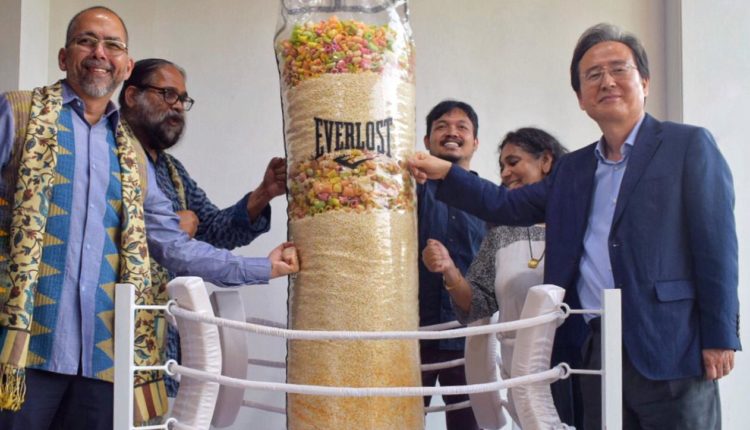Indonesia’s “The Food Diplomacy: Makan Ngga Makan Asal Kumpul” exhibition reaches New Delhi

New Delhi. The month and a half long exhibition “The Food Diplomacy: Makan Ngga Makan Asal Kumpul” of Indonesia origin was inaugurated on June 14 at the Korean Cultural Centre, New Delhi.
The exhibition will be on view at Baek Nam June Hall of Korean Cultural Centre India, New Delhi till July 30.
The exhibition uses the terms to the cultural gathering in Indonesia as an ephemeral platform to extend the ideas from every artist that participates in food practices which are critically related to health, culture, socio-politics, and any other arts through exhibitions, shows, and workshops.
 Present on the occasion were Shin Bong-kil, Ambassador of the Republic of Korea to India, Sidharto Reza Suryodipuro, Ambassador of the Republic of Indonesia, Adwaitia Gadanayak, Director General of the National Gallery of Modern Art in, Kim Kum-pyoung Director Korean Cultural Centre India – all with their spouses, exhibition curator M. Haryo Hutomo and the team of artists.
Present on the occasion were Shin Bong-kil, Ambassador of the Republic of Korea to India, Sidharto Reza Suryodipuro, Ambassador of the Republic of Indonesia, Adwaitia Gadanayak, Director General of the National Gallery of Modern Art in, Kim Kum-pyoung Director Korean Cultural Centre India – all with their spouses, exhibition curator M. Haryo Hutomo and the team of artists.
Kim Kum-pyoung, Director, Korean Cultural Centre India introduced the dignitaries as well as the curator to the audience.
Shin Bong-kil, Ambassador of the Republic of Korea to India said, “This is an outreach activity from KCCI to South East Asia. Indonesia was chosen with the best artists. This exhibition will make good success.”
Supported by various artistic methods, the presented works were imaginatively designed to negotiate and deliver the issues that were discussed by each artist. The subjects of discourse are food production and distribution modes, minor narratives of Indonesia’s socio-political history related to food sovereignty, contemporary trade politics in the snack industry, spices and herbs as alternative medicine, and the future relation between arts and technological creativity which may offer alternative solutions in minimizing the negative effects of companies within food industry in local-global context.
For example, in some two-dimensional works created by Adi Sundoro, he tried to inform on how the food distribution process has been carried out internationally by companies throughout history using their transportation tools.
In his address, Sidharto Reza Suryodipuro, Ambassador of the Republic of Indonesia said, “Food is, in fact, a very much expression of culture. Hopefully, through such a theme, it will also be a way of understanding culture, sharing culture. Ultimately we say culture is the forefront of diplomacy.”

Bakudapan’s work observes the connection between politics and food through a minor narrative, based on women’s experiences as former political prisoners. This is related to one of the darkest socio-political era in Indonesia history (1960s), which not only evoked genocide but also changed entire policies from agriculture & food to agrarian law, export interest and trade policies.
Adwaitia Gadanayak, Director General of the National Gallery of Modern Art in India said, “Asian countries, our root is so powerful. We connect each other perfectly. With all our things, this is the right time to connect our roots.”
Moving on to the domestic space, work installation created by Fajar Abadi discusses the snacks product that we usually eat during our leisure time such as watching movies or when we are out with our friends. His work relates to political trade on a regional and global scale in the cases of home industries and manufacturers.
Meanwhile, created by Natasha “Tontey” Gabriella is imaginative work about the sustainable future that is led by pests with a cockroach figure since it is the only species that has the ability to survive despite many extinctions and transformative events.
In Fransisca Retno’s work, she will conduct a participatory performance by persuading people to be involved in the process of making herbal concoctions with a mixture of spices. After that, she will let the people taste the result of the concoctions that have been made. In the designed room, House of Natural Fiber creates new-media artworks that informs people of the negative effects that several types of popular foods have on our health.
Then finally, there are the installation and video works created by XXLab over the past few years about the process of industrial waste that produces tofu into ready-made fabrics.
Some Asian countries that have similar cultural backgrounds are also similar in terms of food relations, bio-political practices and its changing practices on the way people consume without considering where the food comes from. In that context, how do we, as a society, practically and theoretically separate the causal relations inherent in capitalism by considering things like; material-discourse, scientific-affective, human-non-human, and cultural-natural elements. Through this project, hopefully, people will be more aware of how the chain of food production and distribution have their exclusive scale in influencing ethical, economic, and artistic values.
Moreover, this project is consciously open to all possibilities about the importance of practice based on research, is value-oriented, and prioritizes critical thinking rather than just the normative problems.
It is curated by M. Haryo Hutomo who has collaborated with some Indonesian artists who work individually or collectively. The artists are Adi Sundoro, Bakudapan: Food Study Group, Fajar Abadi, Francisca Retno, House of Natural Fiber, Natasha Gabriella “Tontey”, and XXLab.

